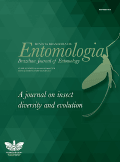
REVISTA BRASILEIRA DE ENTOMOLOGIA
Scope & Guideline
Bridging knowledge in the realm of insect science.
Introduction
Aims and Scopes
- Taxonomy and Systematics:
The journal emphasizes the description and classification of new insect species, providing critical insights into the biodiversity of Brazilian entomofauna. - Ecology and Behavior:
Research on ecological interactions, including predator-prey relationships, mating behaviors, and community dynamics, is a significant focus area, highlighting the ecological roles of insects. - Conservation and Biodiversity:
Studies addressing the conservation of insect species and their habitats, including the impacts of climate change and habitat destruction, are central to the journal's mission. - Applied Entomology:
The journal includes research on the practical applications of entomology, such as pest management, forensic entomology, and the use of insects in agricultural contexts. - Physiology and Morphology:
Investigations into the physiological mechanisms and morphological adaptations of insects contribute to a deeper understanding of their biology and evolution.
Trending and Emerging
- Molecular and Genetic Studies:
There is an increasing trend in studies utilizing molecular techniques to assess genetic diversity, population structure, and phylogenetics, particularly in species of medical and agricultural importance. - Impact of Climate Change:
Research examining the effects of climate change on insect distributions, behaviors, and interactions is gaining traction, highlighting the urgency of understanding ecological responses to global changes. - Urban Entomology:
Studies on insects in urban environments are becoming more prominent, addressing issues related to public health, pest management, and biodiversity in urban settings. - Insect Conservation Strategies:
Emerging research on conservation strategies for threatened insect species and their habitats is increasingly important, reflecting a global recognition of the biodiversity crisis. - Behavioral Ecology:
An upsurge in studies investigating the behavioral ecology of insects, including mating systems and trophic interactions, is evident, showcasing the complexity of insect interactions within ecosystems.
Declining or Waning
- Traditional Pest Control Methods:
Research focusing on conventional pest control techniques is becoming less frequent, as there is a growing emphasis on integrated pest management and sustainable practices. - General Faunistic Surveys:
While faunistic studies are still important, there is a noticeable decline in broad surveys without specific ecological or conservation implications, as more targeted research becomes favored. - Insect Pathology Studies:
Research on insect diseases and pathogens is waning, possibly due to a shift in interest towards ecological and behavioral studies rather than purely pathological investigations.
Similar Journals
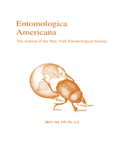
Entomologica Americana
Advancing Knowledge in Insect ScienceEntomologica Americana is a pivotal journal in the field of Insect Science, published by the esteemed New York Entomological Society Inc. With its ISSN (1947-5136) and E-ISSN (1947-5144), this journal serves as a critical resource for researchers, professionals, and students dedicated to the study of entomology. Although it is categorized in the Q4 quartile for Insect Science as per the 2023 Scopus Rankings, where it ranks 179 out of 181, it continues to provide valuable insights into various aspects of insect biology, ecology, and conservation. The journal has been actively publishing since its convergence years from 2009 to 2017, and in selected years thereafter, including 2019, 2021, and 2023. Located at the iconic American Museum of Natural History in New York City, Entomologica Americana is a testament to the ongoing exploration and understanding of the insect world that underpins biodiversity and ecosystem health. Although it does not operate under an Open Access model, it offers a vital platform for scholarly communication and the dissemination of research findings, making it indispensable for anyone involved in or entering the fascinating field of entomology.
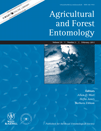
AGRICULTURAL AND FOREST ENTOMOLOGY
Exploring the vital role of insects in sustainable ecosystems.AGRICULTURAL AND FOREST ENTOMOLOGY is a leading journal published by Wiley, focusing on the interface of entomology, agriculture, and forestry. With a robust impact reflected in its Q2 and Q1 quartile rankings in prominent categories like Agronomy and Crop Science, Forestry, and Insect Science, this journal serves as a vital platform for researchers and professionals seeking to advance their understanding of insect impacts on agricultural and forest ecosystems. Since its inception in 1999, it has provided a comprehensive collection of high-quality research, facilitating interdisciplinary discussions and innovations in pest management, biodiversity, and sustainable practices. Although it does not currently offer Open Access, the journal continues to uphold rigorous peer-review standards, ensuring that published works maintain a profound scientific value. As of 2023, its Scopus rankings further signify its prominence in the field, engaging a global audience keen on addressing the pressing challenges faced within agricultural and forest sciences.

JOURNAL OF INSECT SCIENCE
Connecting Research with Real-World ImpactJOURNAL OF INSECT SCIENCE, published by OXFORD UNIV PRESS INC, stands as a pivotal platform in the field of insect science, offering open-access research since 2001. With an impactful presence in the academic community, this journal spans the convergence of entomology and various interdisciplinary studies, establishing itself in the Q2 quartile for both Insect Science and Medicine (miscellaneous) categories as of 2023. This esteemed journal is recognized for its contributions to the understanding and management of insect biology, ecology, and their implications for agriculture and human health, garnering a Scopus rank of 44 out of 181 in Agricultural and Biological Sciences. The Open Access model encourages wide dissemination of knowledge, making the rich repository of research accessible to a global audience. With ongoing publications until 2024, JOURNAL OF INSECT SCIENCE serves as an essential resource for researchers, professionals, and students seeking to deepen their understanding of the crucial role insects play in our ecosystem.

INSECT SYSTEMATICS & EVOLUTION
Illuminating Insect Diversity and EvolutionINSECT SYSTEMATICS & EVOLUTION is a prestigious journal published by BRILL, which has been a vital source of scholarly information since its inception. Specializing in the fields of ecology, evolution, behavior, and systematics within the realm of insect science, this journal garners significant attention with its 2023 ranking in the second quartile across multiple categories, highlighting its relevance and impact in the field. With a focus on advancing knowledge through innovative research and reviews, it serves as an essential platform for researchers, professionals, and students alike, promoting an understanding of insect biodiversity and systematics. The journal’s accessibility options, including its Open Access policy, combined with a broad international scope, ensure that critical findings reach a diverse audience, fostering collaboration and discourse within the scientific community. Situated in the Netherlands, INSECT SYSTEMATICS & EVOLUTION maintains its commitment to excellence and strives to contribute actively to the ongoing dialogue in insect science, making it a must-read for anyone interested in the intricate world of insects.

Alpine Entomology
Illuminating the Ecological Role of Alpine InsectsAlpine Entomology is a pioneering open-access journal published by Pensoft Publishers, dedicated to advancing the study of insect science and ecology, with a particular focus on mountainous environments. Launched in 2017 and accessible online, this journal provides a vital platform for researchers, professionals, and students to share their findings and insights in a rapidly evolving field. With its ISSN N/A and E-ISSN 2535-0889, Alpine Entomology has been recognized for its contributions, achieving Q3 category rankings in 2023 across several disciplines, including Animal Science and Zoology, as well as Ecology and Insect Science. Set in Sofia, Bulgaria, the journal exemplifies a commitment to promoting high-quality research and enhancing collaboration among scientists globally. Through its open-access model, it ensures that groundbreaking research is widely disseminated, helping to bridge gaps in knowledge and fostering a deeper understanding of alpine ecosystems and their intricate insect communities.
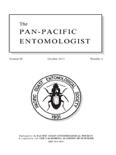
PAN-PACIFIC ENTOMOLOGIST
Connecting Research and Ecology Through InsectsPAN-PACIFIC ENTOMOLOGIST, published by the PACIFIC COAST ENTOMOLOGICAL SOCIETY, serves as a pivotal platform for disseminating research in the field of entomology, encompassing a variety of topics related to insects and their interactions within ecosystems. Operating under the ISSN 0031-0603 and E-ISSN 2162-0237, this esteemed journal has been committed to advancing our understanding of insect science since its initial publication in 1993, with coverage extending to 2024. Notably categorized in the Q4 quartile of the insect science category and ranked in the 5th percentile of Scopus, PAN-PACIFIC ENTOMOLOGIST offers a unique opportunity for scholars, professionals, and students to engage with cutting-edge research and contribute to the scientific dialogue within this specialized field. While currently not open access, the journal is dedicated to the dissemination of empirical studies, reviews, and short communications that elucidate the crucial roles insects play in agriculture, ecology, and public health. Situated in the heart of San Francisco, California, this journal not only enriches the academic community but also promotes a deeper appreciation for the diverse and often under-appreciated world of entomology.

EUROPEAN JOURNAL OF ENTOMOLOGY
Connecting global perspectives in entomological research.The European Journal of Entomology, published by the Czech Academy of Sciences, Institute of Entomology, is a pivotal journal in the field of Insect Science. With a solid impact factor and recognized ranking—placed in the Q2 quartile in 2023, and ranked #72 out of 181—this journal offers a platform for researchers and professionals alike to share insightful studies and advancements in entomological research. Since its inception in 1993, the journal has continuously evolved to cover a wide spectrum of entomological disciplines, establishing itself as an essential resource for academia and industry. Although it operates on a subscription basis, the journal ensures accessibility for a broad audience of scholars, students, and enthusiasts eager to stay at the forefront of entomological science. Located in Ceske Budejovice, Czech Republic, this journal not only highlights European contributions but also embraces global perspectives, making it an indispensable reference point in the ongoing exploration of insect biology and ecology.
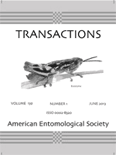
TRANSACTIONS OF THE AMERICAN ENTOMOLOGICAL SOCIETY
Charting the Course for Future Entomological Discoveries.TRANSACTIONS OF THE AMERICAN ENTOMOLOGICAL SOCIETY, published by the American Entomological Society, is a distinguished journal committed to advancing the field of entomology through innovative research and comprehensive reviews. With an ISSN of 0002-8320 and an E-ISSN of 2162-3139, this journal has been a vital resource for entomologists since its inception, showcasing significant findings in insect science as well as ecology, evolution, behavior, and systematics. Although currently not offering Open Access, the journal remains a pivotal platform for professionals, researchers, and students interested in the biological sciences related to insects. The journal's influence is reflected in its Scopus rankings, with a Q3 designation in Insect Science and a Q4 designation in Ecology, Evolution, Behavior and Systematics as of 2023. With a convergence of published years from 1993 to present, TRANSACTIONS aims to foster a deep understanding of insect-related topics, thereby contributing valuable insights that may influence both academic and practical realms within entomology.

APPLIED ENTOMOLOGY AND ZOOLOGY
Pioneering insights for sustainable agricultural practices.Applied Entomology and Zoology, published by Springer Japan KK, is a pivotal journal in the field of insect science, with an impressive track record since its inception in 1966. This esteemed publication, bearing ISSN 0003-6862 and E-ISSN 1347-605X, contributes significantly to the understanding of applied entomology, emphasizing research that supports sustainable agricultural practices and the ecological conservation of insects. Ranked in the Q2 category (2023) for Insect Science with a Scopus rank of #65 out of 181, it is recognized for its rigorous peer-review process and high-quality contributions that push the boundaries of our knowledge. Although it does not currently offer open access, the journal remains an essential resource for researchers, professionals, and students eager to advance their understanding of the complex interactions between insects and their environment. With a focus on practical applications, it aims to bridge the gap between entomological research and real-world implications, fostering innovation and promoting informed decision-making within the scientific community.
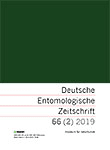
DEUTSCHE ENTOMOLOGISCHE ZEITSCHRIFT
Your Gateway to Cutting-Edge Insect ResearchDEUTSCHE ENTOMOLOGISCHE ZEITSCHRIFT is a premier open access journal dedicated to the vibrant field of entomology, proudly published by Pensoft Publishers. With a rich publication history dating back to 1954, this journal serves as a vital platform for disseminating high-quality research in Animal Science, Zoology, and Insect Science, currently holding a commendable Q2 quartile ranking in these disciplines. The journal embraces the accessibility of science, having transitioned to an open-access model in 2014, ensuring that all readers can engage with cutting-edge findings and innovative studies without barriers. Researchers, professionals, and students alike will find the journal's breadth of topics—ranging from basic ecological studies to applied entomological research—essential for keeping abreast of developments that impact biodiversity and ecosystem functioning globally. With its commitment to supporting the entomological community, DEUTSCHE ENTOMOLOGISCHE ZEITSCHRIFT remains a cornerstone for anyone interested in the intricate world of insects.